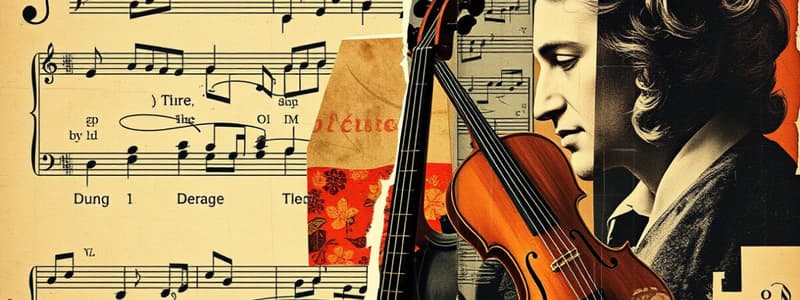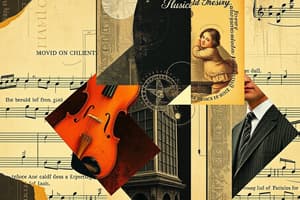Podcast
Questions and Answers
What is the generally understood time period of the Classical era?
What is the generally understood time period of the Classical era?
- 1750 - 1820
- 1750 - 1830 (correct)
- 1600 - 1700
- 1800 - 1900
What does the term 'classical' often refer to?
What does the term 'classical' often refer to?
music from the sixteenth through nineteenth centuries
List two new musical forms introduced during the Classical era.
List two new musical forms introduced during the Classical era.
sonata and symphony
What were two main influences during the Classical period?
What were two main influences during the Classical period?
The Classical period overlaps with the Age of Enlightenment.
The Classical period overlaps with the Age of Enlightenment.
The city of ______ became a melting pot of ideas and experiments in music during the Classical period.
The city of ______ became a melting pot of ideas and experiments in music during the Classical period.
How was Classical music described?
How was Classical music described?
What did composers want individuals to do during the Classical period?
What did composers want individuals to do during the Classical period?
How does the music from the Classical period compare to that of the Baroque period?
How does the music from the Classical period compare to that of the Baroque period?
During the Baroque period, composers had greater freedom in choosing their musicians.
During the Baroque period, composers had greater freedom in choosing their musicians.
What three parts are included in sonata form?
What three parts are included in sonata form?
What is the role of the Exposition in sonata form?
What is the role of the Exposition in sonata form?
What characterizes the Development section of sonata form?
What characterizes the Development section of sonata form?
Flashcards are hidden until you start studying
Study Notes
The Classical Era
- Defined as the period when "classic" works of standard repertory emerged, notably between 1750 and 1830.
- Prominent composers of this era include Haydn, Beethoven, and Mozart.
Terminology Confusion
- The term "classical music" often encompasses works from the sixteenth to nineteenth centuries, merging different styles and eras into one label.
Specific and General Use of "Classical"
- "Classical" music relates specifically to works from the Classical period but is also used broadly for music from various historical contexts influenced by classical composers.
New Musical Forms
- Significant forms developed during this era include the sonata and symphony, which played a crucial role in the evolution of Western music.
Cultural Influences
- The Classical period drew inspiration from societal changes, cultural movements, and ancient civilizations.
Age of Enlightenment
- The Classical music period overlaps with the Age of Enlightenment, emphasizing reason, science, and questioning of traditional norms.
Social Ideals
- A push for greater equality in society emerged from this movement, advocating for broader public participation in governance.
Characteristics of Classical Music
- The Viennese School is central to Classical music, referring to the influential works and composers from Vienna, Austria.
Vienna as a Cultural Melting Pot
- Vienna fostered collaboration among composers, with Haydn, Mozart, and Beethoven significantly contributing to its musical landscape.
Musical Simplicity
- Classical music is characterized as "down to earth," aiming for beauty through simplicity and balance.
Accessibility of Music
- Composers intended their music to be appreciated by individuals without formal training, promoting widespread enjoyment and understanding.
Sound Characteristics
- Classical music is described as lighter and more balanced compared to the Baroque period, featuring homophony and less ornamentation, while also incorporating contrasts.
Shift in Composer Support
- During the Baroque period, composers were reliant on patrons and local musicians; this shifted in the Classical period as composers sought skilled musicians in urban centers like Vienna.
Growth of Instrumentation
- The Classical era marked the rise in popularity of instrumental music, including full sections of woodwind, brass, and string instruments in orchestras.
Sonata Form
- Sonata form consists of three sections in an ABA structure, prominently utilized by composers such as Haydn and Mozart.
Main Parts of Sonata Form
- Exposition introduces musical themes and key relations, likened to characters in a narrative.
- Development elaborates on the themes, fostering tension and variability, contributing to a dynamic listening experience.
Studying That Suits You
Use AI to generate personalized quizzes and flashcards to suit your learning preferences.




